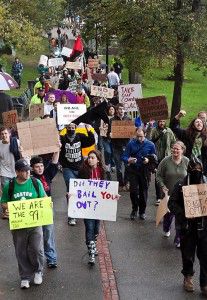When freelance reporter John Knefel was arrested while covering the one-year anniversary of the Occupy movement in New York, he met two teenagers from Philadelphia who were detained for protesting.

One of the teenagers said a police officer had harassed him for his demonstration and said his father would be ashamed of him, Knefel said.
“The 17-year-old kept talking and said, ‘but being in here with all of you guys and feeling all this solidarity, I know that he’s wrong and I know that we are doing the right thing, and it’s just really great to be here with you guys,’” Knefel said. “It was a really moving moment.”
Although media coverage has waned on Occupy and the Tea Party movements that emerged from the country’s frustration with the state of the government, the protesting spirit has encompassed youth from both sides of the political spectrum and left an impact on the country.
John Berg, a professor of government at Suffolk University, said the Tea Party rallied for political change through the political system.
“The tea party is a much more conventionally political movement,” Berg said. “They really want to have an impact on elections. And they had some impact on elections.”
Occupy Wall Street objectives were not conventionally political, Berg said.
“They weren’t about influencing elections,” he said. “They were about influencing public dialogue.”
Berg said Occupy achieved its goal of education and changed the dialogue in D.C.
“If you look back, they were very successful in creating much more discussion and awareness of inequality,” he said. “I think that the Occupy movement has a lot to do with why we’re talking about how wealthy Romney is.”
Through various means of activism and with different bases of support, Occupy Wall Street and Tea Party representatives said they are still determined to remedy an overbearing, corrupt political system.
“The tea party is just as upset at corruption and some of the bailouts as we are,” said Linnea Palmer Peyton, a 24-year-old Occupy organizer. “In terms of the things we are upset about, I’d say we have a lot in common.”
Michael Johns, a former speechwriter for George H. W. Bush and a Tea Party leader, said both movements have some similar grievances with government, but that techniques varied widely between both groups.
“The ideological solutions to these problems varied almost immediately with the Occupy movement, which didn’t develop any solid policy,” Johns said.
Occupy Wall Street, although garnering support from older people, is a youth-based collective, said Linnea Palmer Peyton, a 24-year-old Occupy organizer.
“People would say, ‘Oh, young people, they aren’t involved politically enough. They don’t protest,’” she said. “And people don’t say that anymore.”
Knefel, who covers Occupy Wall Street frequently and is the host of Radio Dispatch, said the youth activism of Occupy challenges contemporary ideas of being politically involved.
“It’s really exciting to see teenagers and colleges students who are political, but not in the way that feeds into a two-party system,” he said.
Although the Occupy movement is known for its infusion of youth, Johns said that Tea Partiers are “as diverse as America.”
Keli Carender, one of the first Tea Partiers, said the Tea Party is not as homogeneously young as Occupy, but there is a young faction of Tea Partiers she works with.
“Our staff is probably half under 36 and the other half is older,” Carender, 33, said about her co-workers at the Tea Party Patriots organization.
Johns said the Tea Party has approached political activism through the channels of government, making it more successful than the tactics of Occupiers.
By working through the political mechanisms, the Tea Party took over the House of Representatives and has accomplished clear, attainable goals, he said.
“The Occupy movement has had minimal, perhaps no serious influence or leverage,” he said. “You can’t point to any member of Congress or elected official or piece of legislation. The Tea Party can point to many of those things.”
Peyton said that through education and awareness, citizens will rise up and realize they can create change themselves.
“Why I think Occupy has more lasting power is we show people that they can make change and we can educate them about issues,” Peyton said. “We don’t have to tell people that voting is one way they can make change. They have more power than that.”
Still, these two movements have many parallels and could have become allies under different circumstances, Carender said.
“If people hadn’t been so quick to demonize the party because they were afraid we were going to destroy progressive accomplishments, they would have seen that we agree that cronyism sucks and we don’t want tax-payer dollars going to friends of elected officials,” Carender said. “It doesn’t matter if they are on the right or the left.”


















































































































